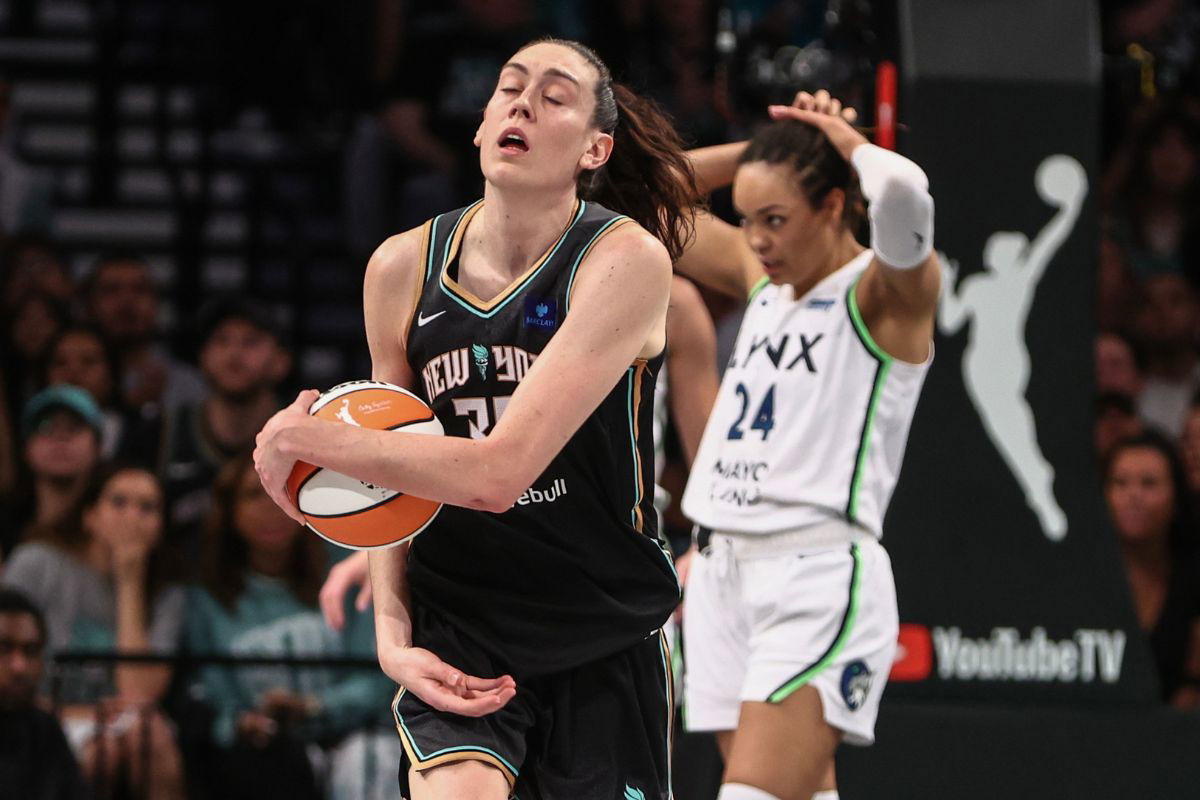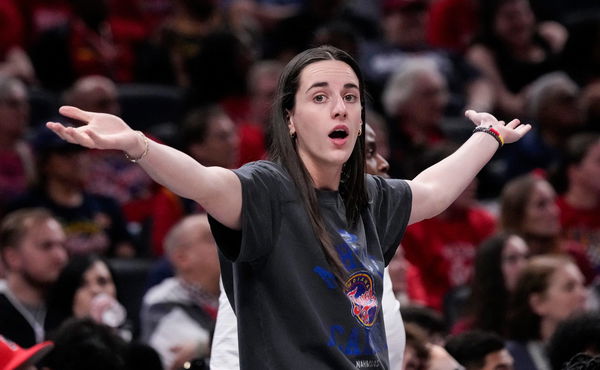
Imago
Oct 20, 2024; Brooklyn, New York, USA; New York Liberty forward Breanna Stewart (30) reacts after missing a basket in the second quarter against the Minnesota Lynx during game five of the 2024 WNBA Finals at Barclays Center. Mandatory Credit: Wendell Cruz-Imagn Images

Imago
Oct 20, 2024; Brooklyn, New York, USA; New York Liberty forward Breanna Stewart (30) reacts after missing a basket in the second quarter against the Minnesota Lynx during game five of the 2024 WNBA Finals at Barclays Center. Mandatory Credit: Wendell Cruz-Imagn Images

Imago
Oct 20, 2024; Brooklyn, New York, USA; New York Liberty forward Breanna Stewart (30) reacts after missing a basket in the second quarter against the Minnesota Lynx during game five of the 2024 WNBA Finals at Barclays Center. Mandatory Credit: Wendell Cruz-Imagn Images

Imago
Oct 20, 2024; Brooklyn, New York, USA; New York Liberty forward Breanna Stewart (30) reacts after missing a basket in the second quarter against the Minnesota Lynx during game five of the 2024 WNBA Finals at Barclays Center. Mandatory Credit: Wendell Cruz-Imagn Images
What was meant to be a turning point for the WNBA turned into what Breanna Stewart called a “wasted opportunity.” During All-Star weekend in Indianapolis, more than 40 of the league’s top players—stars and veterans alike—crammed into a hotel conference room for the first in-person meeting with the league to negotiate a new collective bargaining agreement. The turnout was so large that they ran out of chairs. It wasn’t just a meeting—it was a show of force. And thanks to reporting from ESPN’s Holly Rowe, we know just how decisive that moment was behind closed doors.
Watch What’s Trending Now!
According to Rowe, the players’ demands were direct and unified. She revealed from the private meeting: “There was a strong feeling among the players, which they expressed during Thursday’s meeting, that they want to have a piece of the revenue—that is, they want revenue sharing.”
Rowe continued, emphasizing the incredible solidarity in the room and the historic nature of the gathering: “In fact, so many players attended the face-to-face meeting—the first such meeting about the CBA—that they ran out of chairs. What’s clear is that the players are united in their goal of securing a fair share of the league’s revenue. The message is that they’re standing together, acting like a united nation, and they want a real commitment to revenue sharing and equality.”
But what happens when a united front meets a brick wall? According to the players, that powerful message was met with little more than corporate jargon and empty platitudes. “We could have really kind of gotten into a deeper dive of everything but it was a lot of fluff that we couldn’t get past,” Stewart said, the frustration evident in her voice.
So what’s the big holdup? It all comes down to the money. And when you look at the numbers, can you blame them? The WNBA isn’t just growing; it’s exploding. Franchise values have shot up by 180% in the last year alone. The new team in Golden State is already worth half a billion dollars. The league just signed a new $2.2 billion media rights deal. The money is pouring in.
Yet, the players feel like they’re being left behind. The average salary is just over $100,000, a fraction of the league’s revenue. The players, led by union president Nneka Ogwumike and VPs Stewart and Napheesa Collier, are done accepting what they see as crumbs. “Rev sharing is truly transformational,” said Las Vegas Aces star Kelsey Plum. “We want a piece of the entire pie. Not a piece of part of the pie.”
But the league’s first offer? According to Collier, it wasn’t even in the same universe. “We were disappointed, for sure, in what they came back with,” she said. “It was just nowhere near what we asked for. Or even in the same conversation.” The feeling in the room was that the league was trying to dazzle them with “fancy numbers and some fancy language,” as Gabby Williams put it. The players weren’t impressed.
The clock is ticking. The current CBA expires on October 31, and with a potential work stoppage looming, the stakes couldn’t be higher. The players are unified and clear on their demands. As Natasha Cloud of the New York Liberty said, “We’re not going to be holding hands through the CBA. We’re fighting for what we’re due, what we’re worth, our value.” The league has repeatedly told them, “We hear you.” But as the players clarified this week, being heard is no longer enough. They want action. And when that action didn’t come in the negotiating room, they decided to take matters into their own hands.
“Pay us what you owe us”: Caitlin Clark, Napheesa Collier, and the players send a message
As the All-Stars took the court for warmups on Saturday night, they did so in black T-shirts with a bold, defiant message printed in white: “Pay Us What You Owe Us.” It was a powerful, visual statement, a sign that the private fight over the CBA was now a public battle for respect.
The league’s brightest new star, Caitlin Clark, spoke about the moment’s importance, even though she was sidelined with an injury. She made it clear what the fight is all about. “That’s one of the things we’re in the room fighting for,” Clark said. “We should be paid more and hopefully that’s the case moving forward as the league continues to grow. I think that’s something that’s probably the most important thing that we are in the room advocating about.”
For Clark, the real power wasn’t in the shirts, but in the unity behind them. She spoke about the historic turnout for the CBA meeting, a mix of young stars and established veterans, all on the same page. “That was the best part of it, being in the room and there’s over 40 other players in this league,” Clark said. “I’m sure a lot more would’ve loved to be in there… and I think that’s the most powerful thing. All the girls across the league just being in that room together.”

Imago
Syndication: The Indianapolis Star Indiana Fever guard Caitlin Clark 22 reacts to a call from the referee on Friday, May 30, 2025, during the game at Gainbridge Fieldhouse in Indianapolis. The Connecticut Sun defeated the Indiana Fever, 85-83. Indianapolis , EDITORIAL USE ONLY PUBLICATIONxINxGERxSUIxAUTxONLY Copyright: xGracexHollars/IndyStarx USATSI_26335334
All-Star captain Napheesa Collier echoed that sentiment. She described the player turnout as having “the most participation in league history,” a clear signal to the league that this isn’t just a small group of disgruntled players. “The players are obviously taking this really seriously,” Collier said. “I think there’s a really strong message that we’re standing really firm on certain areas that we feel really strongly that we need to improve on and I think we got that message across.” The message from the private meeting was now public, printed on their chests for the whole world to see. The ball is now in the league’s court.

